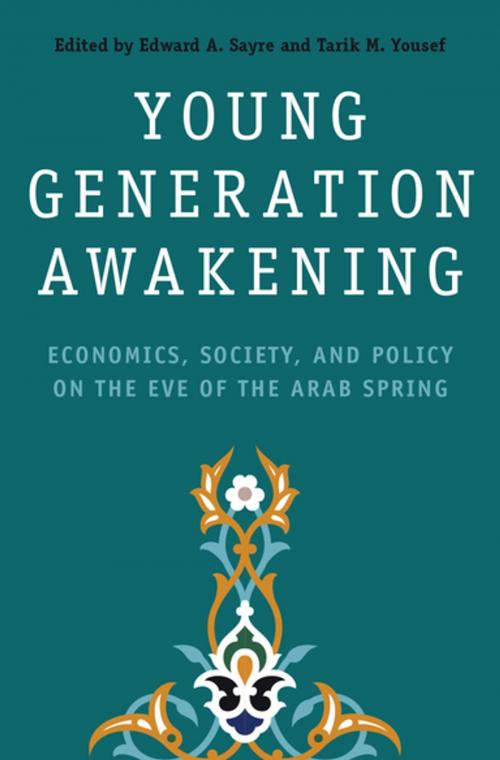Young Generation Awakening
Economics, Society, and Policy on the Eve of the Arab Spring
Business & Finance, Economics, Economic Development, Nonfiction, Social & Cultural Studies, Political Science, Politics, Practical Politics, International| Author: | ISBN: | 9780190224646 | |
| Publisher: | Oxford University Press | Publication: | June 28, 2016 |
| Imprint: | Oxford University Press | Language: | English |
| Author: | |
| ISBN: | 9780190224646 |
| Publisher: | Oxford University Press |
| Publication: | June 28, 2016 |
| Imprint: | Oxford University Press |
| Language: | English |
The street protests that erupted in Tunisia in December 2010 and spread quickly throughout the Middle East surprised not only the entrenched dictators of the region but also international observers who collectively had taken for granted the durability of Middle Eastern authoritarianism. Specifically, the Arab Spring uprisings debunked the prevailing notion that youth were disengaged from political life by their economic exclusion and tight regime control of their mobilization. Indeed, the one consistent feature across the uprisings, whether peaceful or violent, was the key role played by young people. What has remained unclear is why youth became the vanguards of the Arab Spring protests and why they have not played a more prominent role in the transitions that followed. To address these questions, the authors in this volume use updated data sets on demography, employment, education, inequality, social media and public sentiment to examine the underlying socioeconomic conditions of young people in the Middle East at the time of the uprisings and offer a mosaic of analytical explanations linking those conditions from 2009-2011 to the revolts of 2010-2012. The findings in the volume confirm the inadequacy of traditional narrow explanations rooted in demographic profiles, economic grievances or political exclusion in accounting for the complex socioeconomic dynamics facing youth and societies at large in the Middle East in the period leading up to the Arab Spring. The contributors emphasize the fundamental institutional rigidities in the region's policy space and evaluate potential approaches to policy reform that can promote youth inclusion and help transform the region's political economies in the post Arab Spring environment of persistent economic volatility, social unrest and political instability.
The street protests that erupted in Tunisia in December 2010 and spread quickly throughout the Middle East surprised not only the entrenched dictators of the region but also international observers who collectively had taken for granted the durability of Middle Eastern authoritarianism. Specifically, the Arab Spring uprisings debunked the prevailing notion that youth were disengaged from political life by their economic exclusion and tight regime control of their mobilization. Indeed, the one consistent feature across the uprisings, whether peaceful or violent, was the key role played by young people. What has remained unclear is why youth became the vanguards of the Arab Spring protests and why they have not played a more prominent role in the transitions that followed. To address these questions, the authors in this volume use updated data sets on demography, employment, education, inequality, social media and public sentiment to examine the underlying socioeconomic conditions of young people in the Middle East at the time of the uprisings and offer a mosaic of analytical explanations linking those conditions from 2009-2011 to the revolts of 2010-2012. The findings in the volume confirm the inadequacy of traditional narrow explanations rooted in demographic profiles, economic grievances or political exclusion in accounting for the complex socioeconomic dynamics facing youth and societies at large in the Middle East in the period leading up to the Arab Spring. The contributors emphasize the fundamental institutional rigidities in the region's policy space and evaluate potential approaches to policy reform that can promote youth inclusion and help transform the region's political economies in the post Arab Spring environment of persistent economic volatility, social unrest and political instability.















